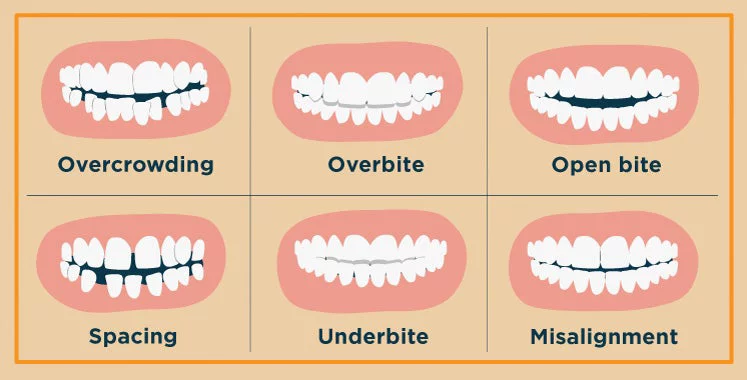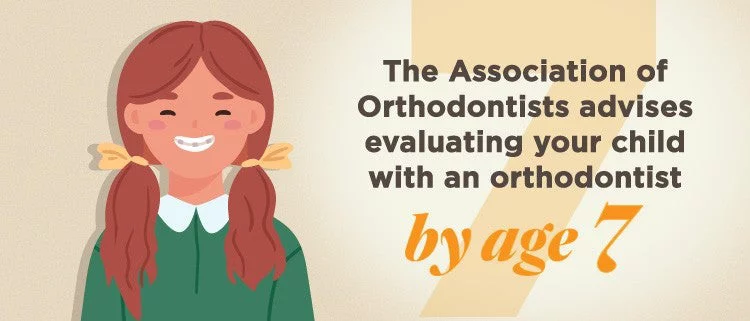Braces are often considered a rite of passage that happens for most people during early adolescence. Braces can take crowded or crooked teeth and align them for a straight, beautiful smile. While it is common for teens to have braces, orthodontic care often needs to start earlier. In addition, braces are about much more than straightening teeth. If you have kids – even young kids – it is important to get them evaluated for potential problems that can be corrected with braces.
Kids Braces: Why do they need them?
What Age do Kids Get Braces?
There is no specific age for braces because the question of whether or not a child can get braces is based on the child's needs. Braces are designed for permanent teeth, which means that your child must have some permanent teeth to get braces. There are some situations where a kid gets braces even though some permanent teeth have not grown in. In those situations, the primary reason for the braces is about something other than simply straightening teeth.

How to Tell if Your Kid Needs Braces
It is not always easy to tell if your child needs braces. Your child can have teeth that look straight but still need braces. Bite issues may not be evident in the way your child’s teeth look, but they have the potential to cause issues like jaw pain, headaches, and tooth damage over time. Correcting your child’s bite is an important reason to invest in braces but one that you may not be able to identify on your own. Ultimately, the only real way to determine if your child needs braces is to get the help of an orthodontist.
When Should My Child See an Orthodontist?
Why Age 7 is the Right Time for an Orthodontic Exam
- Orthodontists can spot subtle problems with jaw growth and emerging teeth while some baby teeth are still present.
- While a child’s teeth may appear to be straight, there could be a problem that only an orthodontist can detect.
- A check-up may reveal that a child’s bite is fine. Or, the orthodontist may identify a developing problem but recommend monitoring the child’s growth and development, and then, if indicated, begin treatment at the appropriate time for the child. In other cases, the orthodontist might find a problem that can benefit from early treatment.
- Early treatment may prevent or intercept more serious problems from developing and may make treatment at a later age shorter and less complicated. In some cases, the orthodontist will be able to achieve results that may not be possible once the face and jaws have finished growing.
- Guide jaw growth
- Lower the risk of trauma to protruded front teeth
- Correct harmful oral habits
- Improve appearance
- Guide permanent teeth into a more favorable position
- Create a more pleasing arrangement of teeth, lips and face
My Kid Need Braces, Now What?
At that initial appointment, you will also need to get your financing situated. Some dental insurance policies will pay for a part of your child’s orthodontic care. If you do not currently have an insurance plan or financing option for your child’s braces, the Smile Generation has some options that can help. You can explore dental plans and financing options to determine the better option for you.

What Will Happen if My Child Does Not Get Orthodontic Care?
Find a Dentist Near You to See if Your Child Needs Braces
It is important to find a local and trusted orthodontist to provide care to your child. If your kids need braces, you will go to orthodontist appointments more frequently than normal dentist appointments. You need to choose an orthodontist who is conveniently located so you can get to those appointments when they are scheduled. It is also important to find a top-notch orthodontist because you want the best care possible for your child. If you're in search of a trusted orthodontist near me, the find a dentist tool from the Smile Generation lets you search for dentists by location and specialty. You can quickly look up a list of orthodontists in your area to find one for your child.
The dentists who are part of the Smile Generation network are trusted providers who meet a high set of standards. You can use the tools provided by the Smile Generation to find a local orthodontist and resources on paying for orthodontic care.
Find your trusted, local dentist today!
Sources
- American Association of Orthodontists. (n.d.). Is there a benefit to early treatment? AAO. https://aaoinfo.org/whats-trending/is-there-a-benefit-to-early-treatment/
- American Association of Orthodontists. (n.d.). Two-thirds of what goes on in your mouth is below the surface. AAO. https://www3.aaoinfo.org/blog/two-thirds-of-what-goes-on-in-your-mouth-is-below-the-surface/
- American Association of Orthodontists. (n.d.). Early orthodontic care may help you avoid costly treatments. AAO. https://www3.aaoinfo.org/blog/early-orthodontic-care-may-help-you-avoid-costly-treatments/
Smile Generation blog articles are reviewed by a licensed dental professional before publishing. However, we present this information for educational purposes only with the intent to promote readers’ understanding of oral health and oral healthcare treatment options and technology. We do not intend for our blog content to substitute for professional dental care and clinical advice, diagnosis, or treatment planning provided by a licensed dental professional. Smile Generation always recommends seeking the advice of a dentist, physician, or other licensed healthcare professional for a dental or medical condition or treatment.








